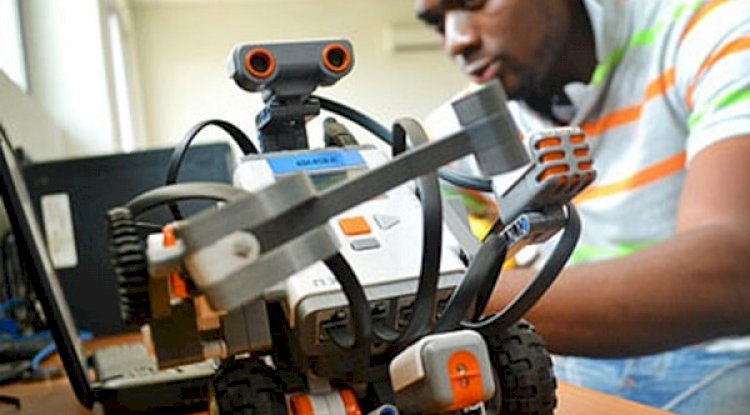Artificial Intelligence - The Challenges and Benefits To The African Continent
The wave of artificial intelligence and ways in which Africa can become a partaker and see improvements.

For many of us, Artificial intelligence (AI) conjures up images and scenes from science fiction of advanced, human like robots programmed to do household chores and operate alongside humans. However, these popular conceptions fail to capture fully the variety of ways in which AI is currently impacting greatly on people around the world. Machine learning forms the basis of all things AI. While many people has for long primarily associate AI with robotics, AI in its most basic and simplest form, uses algorithms to make predictions. Machine learning involves applying computer science, calculation, and mathematics to large datasets in order to deduce patterns and learn from as well as adapt to these patterns. Machine learning can allow individuals and organisations to gain insights that would otherwise escape human observation and analysis. Thus, AI can enable better decision making and can assist in tackling complex challenges (which is much needed in Africa). In short, AI relies on smart machines that process data in order to mimic and predict human behavior.
Far from science fiction as imagined, AI is deployed in almost all the technologies we use daily, from Apple devices, Google’s facial recognition system, Instagram face filters, Facebook news feed, Netflix, and Spotify all draw on machine learning to process and analyze large amounts of data in order to improve and personalise products and services. Governments and public entities also use AI for a wide variety of applications. For example, facial recognition is used by police to track and identify criminals or by customs and border control when scanning passports and cities, and districts develop customer service chatbots to help with public service delivery. Artificial Intelligence is beneficial for many aspects of our lives. For instance, in the health sector, it can be used to identify and track infectious diseases, to assist those with physical disabilities, to provide novel forms of information on agricultural solutions for local communities, and within voice recognition for visual or hearing impairments in individuals.
However, as with all emerging technologies, it is important to consider the societal and policy implications of AI as well as the ways in which diverse populations can be feasibly impacted by the deployment and use of these new technologies. This is especially the case for those who live in developing countries, where the debate about the productive benefits and societal impact of AI needs to be kept in context within the social and economic realities (as they very well abound). Below we analyse potential problems to be faced with the introduction of AI to the continent.
THE PROBLEM OF HEAVY DATA, ACCESS AND FAST CONNECTIVITY
As AI relies on large amounts of data, the most important questions and concerns relates heavily to access and cost of processing data. As at March 2020, only 28.2% of people in Africa had access to the internet. As data is the prerequisite asset allowing AI systems to function, bordering questions about connectivity and unequal access to data also must be considered. For example, in Nigeria data is expensive and internet connectivity variable. These puts data developers and entrepreneurs at a disadvantage. Without reliable core infrastructure, affordable data plans, and easy access to technologies, current digital divides will only be broder with the rise and continued advancement of AI. This is especially true for the case of areas in which access to the internet is limited to low bandwidth mobile, as many AI applications require very fast internet speeds and much improved software.
With slower and less reliable internet access, African developers operate at a competitive disadvantage. Technological companies based in Europe and the US are thus able to draw materials or data from the developing world, and then “import” them back as finished goods (software). In this way, AI risks becoming a potential extractive industry that pulls resources out of the continent to the benefit of others, designing closed source software that often cannot be used by very creative African developers.
THE ISSUE OF PRIVACY - PROTECTING AND SECURING AFRICAN'S DATA
Africans, need to better understand how data, especially sensitive data such as biometrics (voice, facial, fingerprints, etc.) is acquired, shared, and eventually used. There is far too little transparency around data collection and few legal mechanisms for data protection within developing countries. Questions here should be, What are the safety measures put in place to guard against data leak and hacks? How can we ensure that data is not exploited or misused by companies or developers? To gain trust and confidence in AI systems, individuals need better ways to control and secure their data online, and entities engaged in data collection need to better disclose the ways in which data is collected, shared, sold, stored, and applied. After all any information shared is supposedly private to the sharer.
THE PROBLEM OF LANGUAGE AND LOCAL RELEVANT CONTENT
Languages, cultures and traditions differ among the African continent, thereby posing a challenge to the full implementation and benefits of AI in Africa.
To understand these challenges better, let's look at an example. If I ask SIRI in my native language about the weather in Nigeria, it is very certain I’ll not receive a correct answer or that SIRI will even understand this simple question. Applications that employ AI are largely built in major languages such as English and Chinese, and as of now, no such application that understands many African languages have been advertised/ placed on the market. If these barriers are not eliminated, with more emphasis placed on AI development for local languages and local content, AI will as said earlier will aggravate the digital divide and exclude certain individuals from the full benefits of artificial intelligence. In order to build more inclusive AI technologies for diverse groups of Africans, it is necessary to adapt initiatives to local communities and their diverse needs. For instance, to address facial recognition systems mis - identifying black faces, AI technologies should be designed by Africans for local issues. Reason being, the locals understand better the unique needs of various communities. In contexts where digital literacy is a barrier, local users should be consulted throughout the development of AI applications. This will hereby create an inclusive environment where, for example, the illiterate farmer in a rural area can better access information on agricultural innovations and pricing using voice based AI applications, while a local teacher on the other hand can find new curricula for her students.
A KNOW HOW IN I.T SKILLS
As per global estimates, Africa has the highest youth population in the world, with 60% of the African population under 25 years of age. How do developments in AI differentially impact this younger generation? To strive in this world of AI and to be fully empowered in digital spaces, specific skills are required. Digital literacy remains a challenge, with few avenues for formal training around not only the use of digital technologies but also more advanced technical skills. Data collected in developing countries, compiled by the International Telecommunications Union (ITU), reveals that major barriers to internet uptake in developing countries is the lack of education and skills. With the dawn of the industrial revolution, it is important to prepare the African youth with digital skills at all levels to handle smart machines, as these will form the bulk of job opportunities and avenues in the nearest foreseeable future.
Finally, it is essential to develop policies and provide resources for user friendly digital literacy programs and IT skill training for certain marginalised group of people, by doing so everyone is able to fully access services, programs, and platforms, and make smart decisions online. These education programs should take into consideration the specific skills needed by specific audiences and those from rural areas. These diverse programs should offer affordable and lower level learning around digital literacy and safety skills, as well as opportunities for more advanced and longer term learning on data management, coding, and technology entrepreneurship.
Africa can be great again and attain previous heights of dominance, AI can make that possible, with focused and deliberate measures put in place to that effect, the continent must and certainly cannot be left behind in this new era of technology advancement.
What's Your Reaction?
























